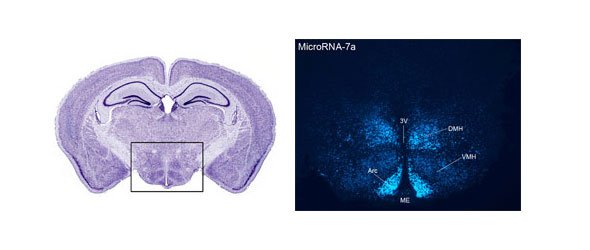Research focus
Brain control of food intake and body weight – Identification of targets for the treatment of obesity
Food intake is controlled by specific neurons located in the hypothalamus. The hypothalamic neuronal networks and the transmitters/mediators regulating ingestive behavior and energy balance are poorly understood.

The research aims at investigating and clarifying the neuronal circuitries and hypothalamic mechanisms that control food intake. The expression of protein and transmitter mediators and microRNAs (miRNAs) is investigated in the hypothalamus of normal animals and mouse models of genetic obesity by immunohistochemistry (confocal microscopy), Western blotting, in situ hybridization and RT-PCR. Using laser microdissection microscopy and microarray technology, we try to find novel genes in selected hypothalamic neuronal populations that participate in the regulation of food intake. Since some hypothalamic neuronal populations are under the influence of circulating hormones, such as leptin and ghrelin, special interest is focussed on molecular components of the blood-brain barrier (BBB) in relation to neurons that control energy balance.
Obesity is a major contributing risk factor to leading causes of death, including cardiovascular disease, diabetes and certain cancers. The present research project will provide new important information on how the hypothalamus regulates food intake and weight homeostasis. The information gained from this project may be used to develop pharmaceutical approaches for the treatment of the increasing population of obese individuals.
